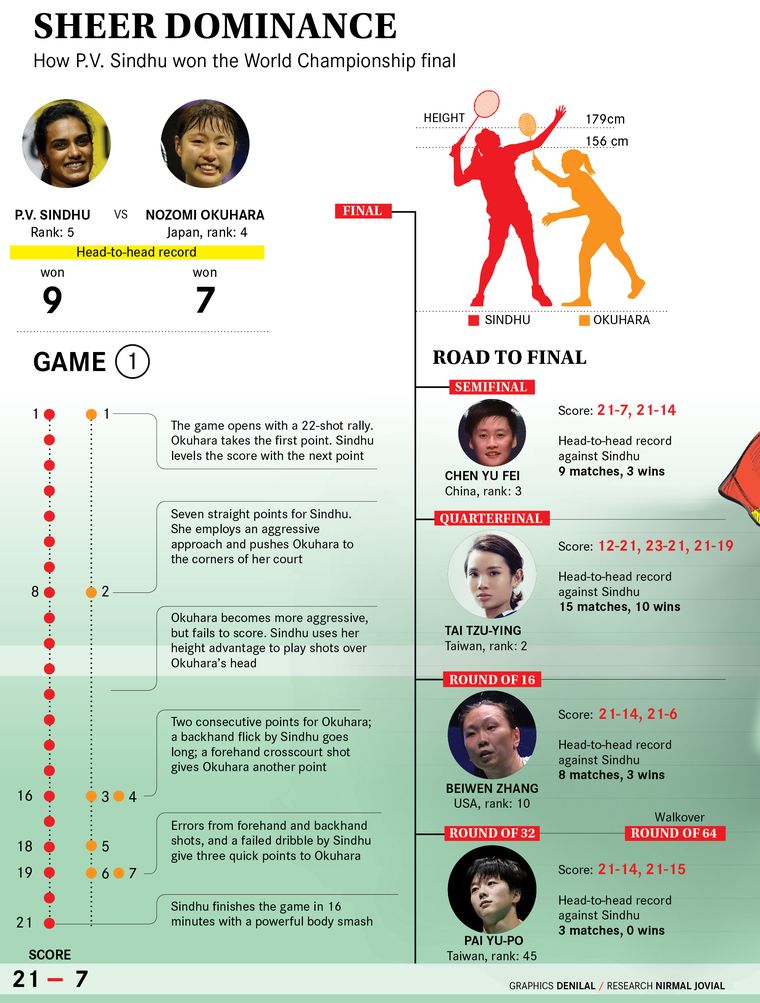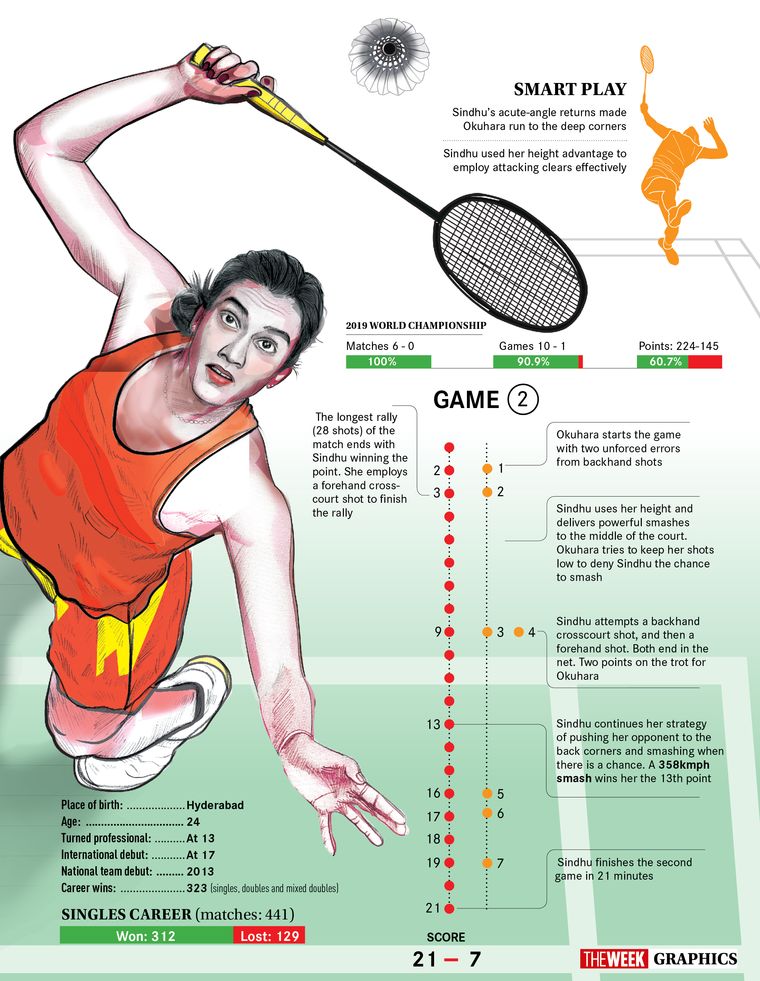THIRTY-SEVEN MINUTES. That is all it took to erase the 110 minutes of pain and agony that P.V. Sindhu endured two years ago at the BWF World Championships. This August 25, she demolished the 2017 world champion Nozomi Okuhara—21-7, 21-7—in the final in Basel, Switzerland. Sindhu’s previous two attempts to become world champion had ended in tears; this time, too, she cried, but for joy. With a 9,000-strong crowd rooting for her, the Olympic silver medallist became the first Indian badminton player to win the gold at the World Championships. She had finally got what she had been missing all this time, Sindhu told THE WEEK.
The first medal for India at the World Championships was a bronze; Prakash Padukone won it in Copenhagen in 1983. The next bronze came 28 years later in a doubles event, thanks to Jwala Gutta and Ashwini Ponnappa. Since 2011, India has never returned empty-handed from the tournament, but the gold had remained elusive. Sindhu, before her golden glory, had won two bronze (2013, 2014) and two silver medals (2017, 2018); Saina Nehwal won a silver in 2015 and a bronze in 2017. B. Sai Praneeth’s bronze in the men’s singles this year is remarkable, too, considering it has been 36 years since Padukone’s feat.
It is no secret that Sindhu, 24, has had a consistent track record, but her close losses in finals had set tongues wagging. Sindhu did not let it get to her though. Instead, she planned and prepared for the World Championships. She skipped the Thailand Open, focusing on physical and technical training. Also, this March, the Badminton Association of India got the Sports Authority of India’s approval to rope in three foreign coaches to ease chief national coach Pullela Gopichand’s workload. While Indonesia’s Flandy Limpele (Olympics bronze medalist) works with doubles players, South Koreans Kim Ji-hyun (Olympian and Asian Games gold medalist) and Park Tae-sang (Olympian) train singles players.
Kim’s brief was simple: make Sindhu win the World Championships and better the team’s performance at Tokyo 2020. Kim rejigged the entire training system, right from warmup. From Sindhu’s fitness regime to her net play, Kim’s efforts were visible. “I had to work with her on her technique, tactics and on-court speed,” Kim told THE WEEK. “She needed to show her tactical game even if she was under pressure or cornered, and that is what I have stressed the most in the past few months.” Kim identified Sindhu’s weak points during training and took videos and later rectified those shots and created new techniques and tactics.
The final at Basel saw a Sindhu unlike before. She attacked from the beginning and never let it slacken; she made Okuhara move around the court, never allowing her to settle into a rhythm; and most importantly, she gave no room for long rallies.
Sindhu did her fitness training at Suchitra Academy, run by her father’s friend in Hyderabad. A highly intensive programme was created to make her stronger, fitter and faster. And, she shunned her mobile phone for two months before the championship.
Kim made it clear to Sindhu that her skill and mental approach had to develop more if she wanted to win a gold. “I ensured that she was relaxed and a relationship of trust and belief was built between us,” said Kim, who believes a loss is a must for a champion. “And, my mantra for her has been: keep working hard and create good karma. When you give more than 100 per cent, the results will follow and success will come to you.”
What did she tell Sindhu before the finals? “Teach me how to dance,” said Kim. And, Sindhu did sway her with her performance.
Edited excerpts from an interview with Sindhu:
Q/ Has it finally sunk in that you are the world champion?
A/(Laughs) I am very happy. It is definitely a wonderful moment. I have been missing this and I have finally got it. I did not have much time to enjoy this moment; I have been a bit busy here and there. But [I] definitely will.
Q/ Did it affect you when people talked about your close losses in finals?
A/ I never thought about that, because when you make it to the finals it is not an easy thing. Even though you lose in the finals—yes, you feel sad—but it is much more important to come back stronger, [to] learn from your mistakes.
Q/ What did you do differently this time with coaches Kim Ji-hyun and Pullela Gopichand?
A/ I prepared really well for the World Championships. I do prepare well for big tournaments. I also missed the Thailand Open for the World Championships.... I have been training with Kim for a couple of months now. She had some changes in mind and we worked on them and everything went well under the guidance of Gopi sir. I have been working more on skill and not just on one aspect. [I have] also [been] working on physical fitness. I train at Suchitra Academy with Srikanth (Verma), my trainer. It has all worked out really well for me.
Q/ Whose idea was it for you to train at Suchitra Academy?
A/ One of my dad’s really close friends, Praveen Raju, has this school. That is how we figured we could go there. I have worked on every aspect of physical training, not just one, [be it] endurance, strength, agility and weight training.
Q/ The difference between you and other top players is so minuscule, and you know each other’s game so well as you play each other often. What is the key to beat these top players?
A/ It is not that we have some particular strategy because we play against each other almost every week in some tournament or the other. So, you go on court and strategise accordingly. For me, especially in the finals, I was prepared for long rallies and long matches. But from the start, I was very aggressive and dominated her (Okuhara) and maintained the lead, and that worked.




